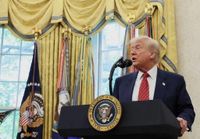The administration of US President Donald Trump is preparing to roll back the export rules on artificial intelligence (AI) chips that were introduced under President Joe Biden. This significant policy shift is reportedly timed to coincide with preparations for Trump’s upcoming visit to the Middle East, where several countries, including Saudi Arabia and the United Arab Emirates, have previously expressed dissatisfaction with the restrictions placed on their ability to purchase AI chips from American companies.
Under Biden, the US government categorized countries into three groups based on the level of restrictions for importing American-made chips. However, this categorization system is likely to be scrapped, and the new approach might not take effect on May 15, 2025, as initially expected. Countries like Russia, Iran, and China were placed in the most restrictive category under Biden’s framework, which imposed maximum bans on AI chip exports.
According to reports, the Trump administration is working on a new policy that would eliminate the categorization system altogether. Instead, the new rule would impose export restrictions on countries that send American chips to China, including Malaysia and Thailand, which have become key intermediaries in the global tech supply chain.
A spokesman from the Bureau of Industry and Security at the US Department of Commerce explained the change, stating, “Biden's AI chip supply rule is too complicated, too bureaucratic, and will hinder the development of American innovation. We will replace it with a much simpler rule that will ensure that the United States remains superior in the field of AI.” This shift in policy reflects growing concerns about the geopolitical implications of AI and semiconductor technology.
As the global competition for AI dominance intensifies, the US is reevaluating how best to balance national security interests with fostering innovation. The Middle East’s growing interest in AI could also signal a shift in tech dynamics, with countries in the region potentially becoming key players in the global AI race if they gain greater access to cutting-edge technologies.
In the backdrop of these developments, many experts are watching closely. The potential rollback of these export regulations could lead to a more favorable environment for countries in the Middle East seeking advanced AI technologies. With the Trump administration signaling a willingness to negotiate new terms, Saudi Arabia and the UAE may find themselves at the forefront of a tech revolution.
Furthermore, this policy change could have ramifications beyond the Middle East. By simplifying export regulations, the Trump administration aims to enhance the competitive edge of American technology firms in the global market. This could lead to a surge in AI-related exports, boosting the US economy and reinforcing its position as a leader in the tech industry.
However, there are concerns about the implications of loosening restrictions on AI chip exports. Critics argue that reducing oversight could lead to sensitive technologies falling into the wrong hands, especially in regions where geopolitical tensions are high. The fear is that countries like China could benefit from easier access to advanced AI technologies, potentially undermining US national security.
Supporters of the rollback, on the other hand, argue that a more open trade policy could foster innovation and collaboration in AI development. They contend that by allowing more countries to access American technology, the US can strengthen alliances and promote global economic growth.
As the Trump administration prepares for its policy rollout, the tech industry is bracing for change. Companies that specialize in AI chip manufacturing are closely monitoring the situation, as the new regulations could reshape their business strategies and market opportunities.
In conclusion, the potential rollback of AI chip export rules marks a pivotal moment in US trade policy. As the Trump administration seeks to recalibrate its approach to technology exports, the implications for both national security and global competitiveness will be significant. With the Middle East poised to play a larger role in the tech landscape, the coming months will likely reveal how these changes will unfold and what they mean for the future of AI technology.




